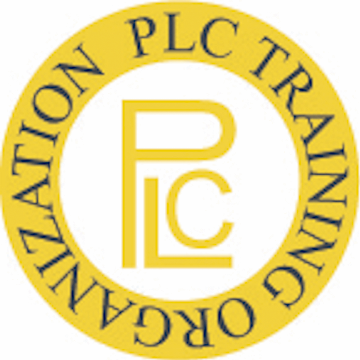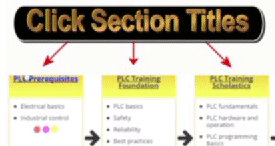PLC Basics Training : PLC Training Best Practices

This is section 2 PLC: Training basics of the PLC Training Best practices. Remember Industry standards are your starting point to developing best practices. Industry standards like
NFPA 79 2015; IEC 60204-1; IEC 61131-3:2013; ICS 21.020: 29 CFR 1910.212.
When you are ready to move on above and beyond Industry standards as a constant improvement program, learn and implement industry PLC programming conventions and industry naming conventions so your PLC programs are more familiar and understood by your customer. That is what the PLC training tip and best practices contained in these 10 sections address. This page is for Section 2 of these 10
PLC Training Tips:
- All occupations seeking PLC training should have at least the minimum electrical safety training.
- As PLCs are predominantly used in the process and manufacturing industries, it is best to take an industrial electrical course before learning PLCs.
- Most troubleshooting that involves a PLC, also involves electrical, so it is a great idea to take the electrical troubleshooting course too, before moving on to PLC training.
- Equally so, getting familiar with the above standards is helpful too.
- Base your training decisions on past experience and current occupation you are seeking the PLC training for. An industrial IT person may not desire as heavy electrical training before learning PLC basics and programming. A maintenance person would want all they can get their hands on.
- Understand from the beginning learning PLCs is a journey, not just one quick course. Once you are caught up, technology and/or technique will have evolved requiring additional training or at least further education.
Section 2: PLC Training Basics:
The tips and best practices on this page will be helpful for ...
The maintenance manager, commercial electrician, industrial electrician, instrumentation tech, mechatronics tech, industrial engineer, industrial IT person industrial software programmer or the mechanic cross training and others.
Bookmark this page or site; as new best ways for PLC technician, industrial electrician, instrumentation technician and others to perform basics task are verified, they will be added here.
PLC Training Best Practices:
2.1 PLC Training Topics:
Besides scholastic PLC topics in manuals, the best way, the safest way and the most reliable to perform task should also be taught
2.2 Working with PLCs and Automation
Inventory all PLCs in your facility
Not only have multiple backups, have PLC program copies printed to PDF. PDF copies allow viewing of program even if you no longer have access to PLC vendor software. A more open method results in less downtime and only takes a few minutes to implement. Also see Advice for Backing Up All PLC and Automation Control Programs.
2.2.1 Working with PLCs Safely
Anything to do with PLC forces is a safety issue and should be handles with standard safety protocols.
1. Forces are a safety issue and should be treated as such...
2. Preferably check with the OEM (machine designer) before doing anything to do with Forces...
3. If no OEM available, at a minimum have someone else check your forces cause and effect research before changing any state of forces ...
4. Never leave a force in place longer than 24 hours. If a longer time frame is needed, use a programming method to achieve the same results, so it can be documented in rung comments too.
5. If the above 4 points were not part of your detailed Forces PLC training, you have not been properly trained.
2.2.2 Working with PLCs Reliably
With PLC software being windows compatible, there are several ways to perform each task, but some times one way is more reliable than another.
2.3 PLC commissioning best practices
Never use default node and IP address
Never leave a PLC force in place longer than 24 hours, follow safety protocol.
More coming soon ...
Next ... Section 3: PLC Training Scholastic Courses Best Practices. To learn more best practices seek out this Instructor Based PLC training.
⇓⇓

